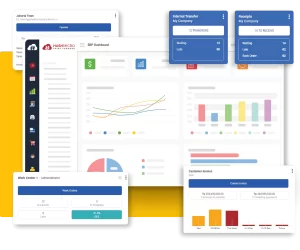As sustainability becomes a business priority rather than just a trend, ESG reporting is gaining traction in Malaysia’s corporate landscape. According to PwC Malaysia, 94% of investors believe ESG-related disclosures directly influence investment decisions—yet many local businesses still struggle to deliver comprehensive, credible reports.
This isn’t just about regulatory compliance or investor relations. Without structured esg reporting, companies risk falling behind in the eyes of customers, partners, and stakeholders. The challenge is real: How do Malaysian businesses align their operations with ESG standards while ensuring efficiency and long-term growth?
This article breaks down what esg reporting entails, why it matters now more than ever, and how your business can adopt a reliable reporting system that supports both compliance and sustainability goals.
Key Takeaways
|
Table of Content
Content Lists

What is ESG Reporting?
ESG reporting is the practice of disclosing how a business performs in three key areas: environmental, social, and governance. Rather than being a trend, it has become a strategic necessity—especially as more stakeholders demand transparency and responsibility from the companies they support or invest in.
The environmental aspect focuses on how a company manages its impact on the planet, including emissions, energy use, and waste reduction. The social component covers how a business treats its people, such as employee welfare, diversity, and community engagement. Governance refers to how the company is structured and led, including ethics, board transparency, and accountability.
For Malaysian businesses, ESG reporting is fast becoming a standard. As sustainability regulations grow tighter, companies are expected to not only talk about their values—but prove them through consistent and credible reporting. Choosing the right ERP can make this process easier by helping businesses centralize data, monitor ESG metrics, and stay compliant with evolving standards.
Is ESG Reporting Mandatory in Malaysia?
As of now, ESG reporting in Malaysia is not universally mandatory for all companies; however, the regulatory environment is evolving swiftly. Since 2016, Bursa Malaysia has required all listed companies to include a sustainability statement in their annual reports, detailing the management of material economic, environmental, and social (EES) risks and opportunities.
To support this initiative, Bursa Malaysia introduced the Sustainability Reporting Guide, aligning with global frameworks like the Global Reporting Initiative (GRI) Standards. In 2023, Bursa further enhanced its commitment by launching the Centralised Sustainability Intelligence (CSI) Platform. This platform designed to standardize ESG disclosures and assist businesses in streamlining their reporting processes.
While private companies are not yet obligated to report, the trend indicates a move towards broader enforcement of ESG reporting across Malaysia. Early adoption, especially with the right tools in place, will position businesses to adapt effectively, ensure compliance, and build trust with investors.
What are the ESG Regulations in Malaysia?
Malaysia is steadily advancing toward a more structured and transparent sustainability framework. As global stakeholders place increasing value on ESG metrics, local regulatory bodies have introduced several guidelines and initiatives to push businesses—especially listed ones—towards more consistent and responsible ESG disclosures.
Here are some of the key regulations currently driving ESG reporting Malaysia-wide:
-
Bursa Malaysia’s Sustainability Reporting Guide (2016, updated in 2022) – This guide mandates that all listed issuers include a sustainability statement in their annual report. Companies must disclose how they manage material economic, environmental, and social (EES) risks and opportunities. The updated version emphasizes board accountability, stakeholder engagement, and the integration of sustainability into business strategy. It also encourages alignment with global frameworks such as the Global Reporting Initiative (GRI), TCFD, and SASB.
-
Centralised Sustainability Intelligence Platform (CSI) (Launched 2023) – To improve the quality and accessibility of ESG disclosures, Bursa Malaysia launched this digital platform for listed companies. It allows businesses to input and track their ESG data in a standardized format. Over time, this system is expected to support benchmarking across industries and raise the overall quality of sustainable business reporting.
-
Sustainable and Responsible Investment (SRI) Roadmap by the Securities Commission Malaysia – Introduced to deepen the local capital market’s focus on sustainable investments, the SRI Roadmap sets out 20 strategic recommendations, including integrating ESG factors into investment analysis and encouraging more sustainability-themed investment products. It reflects a national effort to connect ESG reporting with long-term economic resilience and climate goals.
-
Malaysia’s National Energy Transition Roadmap (NETR) – While not a direct ESG regulation, the NETR outlines decarbonization goals and investment strategies for a greener economy. Companies are increasingly expected to align ESG reports with national sustainability commitments, including net-zero targets and renewable energy adoption.
Together, these regulations and initiatives reflect a shift toward a business ecosystem where ESG performance is just as critical as financial results. Companies that prepare early with the right tools can meet these expectations while gaining a competitive edge in both the local and global market.
What Do ESG Reports Include?
An effective ESG report isn’t just a checklist. It’s a reflection of how a business is contributing to sustainable development while managing its risks and responsibilities. In Malaysia, ESG reports typically follow the structure encouraged by Bursa Malaysia and global reporting standards like GRI, SASB, and TCFD.
Most corporate sustainability reports include a mix of qualitative narratives and quantitative esg metrics under the three core pillars:
1. Environmental
This section shows how the company addresses climate-related risks and natural resource usage, such as
- Greenhouse gas emissions (Scope 1, 2, and sometimes 3)
- Energy consumption and efficiency
- Waste management and recycling efforts
- Water usage and conservation
- Biodiversity impact and environmental compliance
2. Social
This focuses on how the business treats employees, customers, and the broader community, such as
- Workforce diversity and inclusion
- Employee safety, health, and training programs
- Human rights and labor practices
- Customer satisfaction and data privacy
- Community involvement and CSR initiatives
3. Governance
Governance disclosures detail internal controls and ethical business conduct, such as
- Board composition and independence
- Anti-corruption and whistleblowing policies
- Executive remuneration
- Shareholder rights and voting structures
- Risk management frameworks
In Malaysia, companies are also expected to report on their alignment with national policies such as the SRI Roadmap and NETR. The reporting process often requires collaboration across departments HR, operations, finance, and sustainability to consolidate accurate data.
Businesses that rely on manual processes often struggle with fragmented information and inconsistent tracking. To overcome this, many are turning to ESG reporting software or operation management software centralizes ESG-related data and monitors performance in real time.
What is an ESG Score?
An ESG score is a numerical or letter-grade assessment that reflects how well a company performs in environmental, social, and governance areas. Think of it as a sustainability rating similar to a credit score that helps investors, partners, and regulators. It helps to evaluate a business’s risk exposure, ethical practices, and long-term viability.
These scores are typically assigned by independent agencies, each using its own methodology. Common factors assessed include carbon emissions, board diversity, labor practices, data privacy, and anti-corruption policies. Depending on the agency, the weight of each factor may vary based on industry relevance and risk profile.
For Malaysian businesses aiming to boost their ESG performance, keeping track of the right metrics is key. That’s where ESG reporting software becomes critical—it allows companies to monitor real-time progress, maintain reporting accuracy, and improve their ESG score over time by identifying and addressing key gaps.
How is Malaysia Stepping Up in ESG Implementation?
Malaysia is steadily reinforcing its commitment to sustainability. Both regulators and policymakers are rolling out initiatives that make ESG reporting more structured and, in some cases, expected.
The Sustainable and Responsible Investment (SRI) Roadmap by the Securities Commission outlines strategic steps to grow ESG practices in the capital market. It promotes better disclosures, encourages ESG-focused investment products, and pushes institutions to consider sustainability in decision-making.
National policies like the Energy Transition Roadmap also support Malaysia’s shift to a low-carbon economy. Companies are expected to reflect this direction in their corporate sustainability report.
Meanwhile, Bursa Malaysia has strengthened ESG reporting guidelines and introduced the Centralised Sustainability Intelligence Platform. These efforts aim to create consistency across industries, showing that ESG is no longer a future goal—it’s today’s business requirement.
Effortless ESG Reporting with HashMicro ERP System

As ESG compliance grows more demanding, many businesses find it challenging to manage fragmented data across departments. Manual tracking often leads to inconsistent reports and missed deadlines—issues that can affect credibility and investor confidence.
This is where the right ERP becomes a game-changer. HashMicro ERP consolidates ESG-related data from finance, HR, operations, and supply chain into one integrated platform. It helps businesses track key metrics like emissions, energy use, employee welfare, and governance policies with greater accuracy.
With smart dashboards, automated reporting, and real-time monitoring, ERP Software like Hashmicro makes ESG reporting faster and more reliable. It’s designed for companies that want to stay compliant while focusing on long-term sustainability—without getting buried in paperwork.
In addition, HashMicro ERP is fully customizable to align with your industry’s specific ESG metrics. Whether you’re in manufacturing, retail, or construction, the system adapts to your needs—making ESG reporting not just easier, but more relevant and insightful for every stakeholder involved.
Conclusion
ESG reports reflect a company’s real commitment to sustainability, governance, and ethical business practices. In Malaysia, rising regulatory expectations and investor scrutiny are pushing companies to adopt more structured and transparent reporting.
Manually managing ESG data is often time-consuming and error-prone. But with the right ERP, businesses can automate data tracking, generate accurate reports in real time, and ensure compliance—without adding unnecessary pressure to internal teams.
Transform your operations with HashMicro ERP System, a powerful solution designed to make ESG reporting effortless, streamline your business operations, and provide real-time visibility across departments. Equip your team with a system that drives smarter decisions, supports sustainable growth, and elevates your business performance.
Why focus on paperwork when you can focus on real sustainability goals? Try the free demo today and experience how technology can simplify ESG reporting for your business.
FAQ about ESG Reporting
-
What is ESG reporting in Malaysia?
ESG reporting in Malaysia refers to the disclosure of environmental, social, and governance practices by companies, particularly those listed on Bursa Malaysia. It is guided by the Sustainability Reporting Guide, aligned with global frameworks like GRI and TCFD, to enhance transparency and accountability.
-
What are examples of ESG reporting?
Examples include reports on carbon emissions, energy efficiency, employee diversity, community engagement, and governance structures like board independence. These reports combine data and narratives to show how a company operates responsibly and sustainably.
-
What does ESG stand for?
ESG stands for Environmental, Social, and Governance. These three pillars represent the key areas businesses must address to demonstrate sustainability and ethical management to stakeholders.
-
What are the 4 pillars of ESG?
While ESG typically has three core pillars, some frameworks include a fourth economic impact to assess a company’s financial contribution to society. With the right ERP system like HashMicro, companies can track and report these pillars more effectively through integrated, real-time data.































